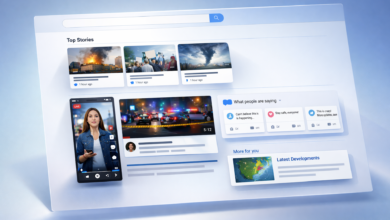Google’s AI Search Journeys Transform SEO With Cindy Krum

▼ Summary
– Google is undergoing a fundamental shift toward AI-driven search, focusing on hyper-personalized experiences and viewing search as “journeys” rather than static queries.
– Cindy Krum theorizes that Google is merging AI Overviews, Discover, and international results to create a unified, next-gen search engine with a stronger learning pipeline.
– Google’s AI initiatives are not new but the culmination of a strategy since 2018, aiming to be predictive, conversational, and personalized while improving ad targeting.
– Discovery is shifting to platforms like TikTok and Reddit, with users relying on multiple sources before turning to Google for final purchase decisions.
– SEO professionals must optimize for entire search journeys, leveraging Google’s navigation suggestions and maintaining brand presence across all digital touchpoints.
Google’s AI-powered search evolution marks a turning point in how users interact with information online. The tech giant isn’t just upgrading its algorithms, it’s reimagining search as personalized journeys rather than isolated queries. Industry expert Cindy Krum, founder of MobileMoxie, has been tracking this transformation closely, revealing insights that challenge conventional SEO thinking.
Krum’s analysis suggests Google is merging three key components, AI Overviews, Discover, and international results, into a cohesive search experience. This integration reflects a strategic shift that began in 2018 when Google started organizing results around entities rather than keywords. What many perceive as new AI features are actually the culmination of years of development toward predictive, conversational search.
The internationalization of Google’s platform plays a crucial role in this evolution. By consolidating country-specific domains, the company creates richer datasets that improve AI understanding across languages. When local content gaps exist, the system now intelligently translates reliable English results, a cost-effective solution that enhances global search quality.
Contrary to speculation about direct monetization of AI features, Krum believes Google’s strategy focuses on refining ad targeting through deeper user understanding. The company aims to serve ads only when conversion likelihood is high, maintaining revenue streams while improving user experience. This approach extends to Performance Max campaigns, where Google leverages its data advantage to optimize ad delivery.
Search behavior itself is changing dramatically. Discovery now happens across multiple platforms, TikTok for inspiration, Reddit for authentic discussions, with Google often serving as the final decision-making tool. Krum emphasizes that brands must establish presence across this entire ecosystem rather than focusing solely on traditional SEO tactics.
For marketers adapting to this landscape, Krum recommends studying Google’s suggested search pathways to understand how the system anticipates user journeys. These navigation layers reveal Google’s interpretation of intent and likely next steps, valuable intelligence for content strategists.
When asked where she’d focus a new marketing effort today, Krum’s answer was immediate: TikTok. Beyond its viral potential, the platform offers unparalleled discovery mechanics and serves as a springboard for cross-platform content distribution. Even with growing competition, its algorithmic promotion of new content creates opportunities for brands to gain traction quickly.
The future of search optimization requires a holistic view of customer journeys rather than isolated keyword targeting. Success depends on maintaining visibility at every touchpoint, from initial discovery to final conversion, while actively shaping industry conversations across digital channels. As Krum observes, the most effective strategies will bridge multiple platforms, aligning with how modern users actually research and make decisions.
(Source: Search Engine Journal)





